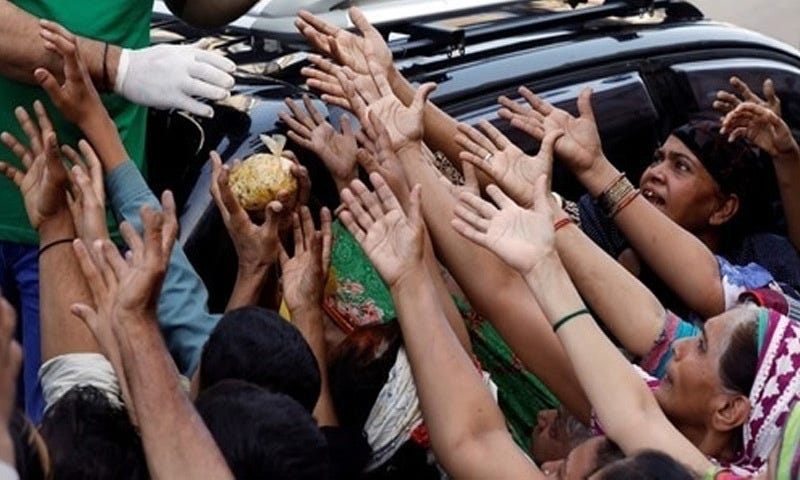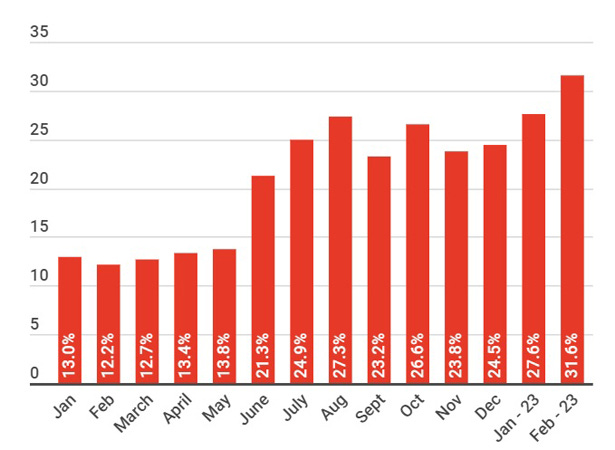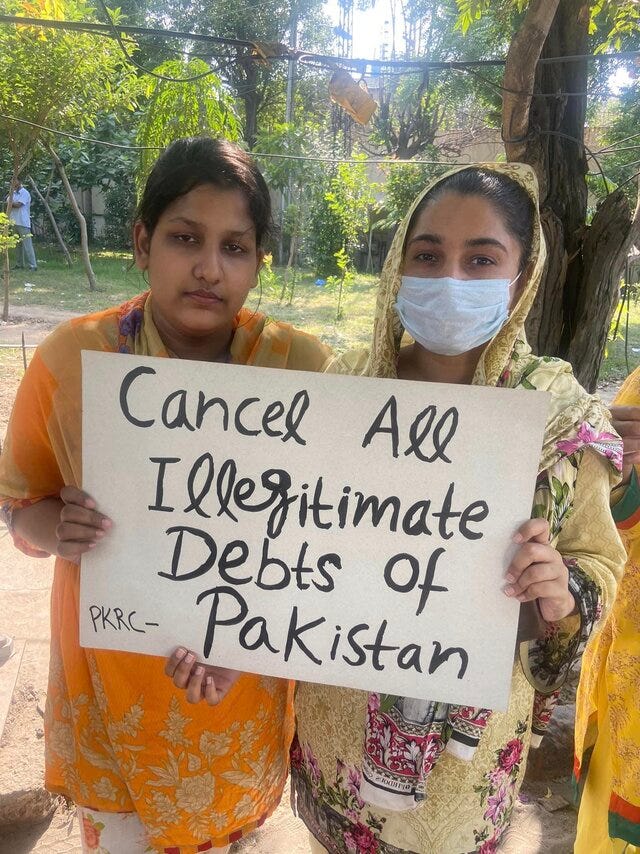Pakistan: The Edge of Abyss
Pakistan is a nuclear-armed state on the brink of collapse and the various terror groups operating there pose a major threat to global security.
Videos of Pakistanis fighting over basic foodstuffs have become common in recent months. Image source
On March 26, five Chinese engineers and one local driver traversed the winding roads of northwest Pakistan's Khyber Pakhtunkhwa province. Their purpose for being in the increasingly dangerous country was to construct a new hydroelectric dam as part of China's $60 billion China-Pakistan Economic Corridor (CPEC). Suddenly, their vehicle was rammed by another vehicle laden with explosives, killing all six. It was the second deadly attack to occur on the dam project: in 2021, another suicide bomber killed nine Chinese citizens and four Pakistanis in an area not far from the latest attack.
This latest incident comes amid a wave of attacks across the country. In southwest Pakistan, Baloch insurgents attacked Pakistan's second-largest naval airbase in Turbat, Balochistan province. On March 20, an attack on Balochistan's Gwadar Port Authority Complex – an integral component of CPEC that would grant China access to Pakistan's only deep-water port – resulted in the deaths of eight Baloch insurgents and five security personnel. On March 16, a group associated with the Pakistani Taliban launched a large-scale attack involving an explosives-laden vehicle and multiple suicide bombings at a security post in Khyber Pakhtunkhwa.
Pakistan's situation appears ever more dire as the country hurdles toward economic collapse and trust in state institutions steadily erodes amid a wave of brutal terror attacks across the country. This rising instability poses a threat not only to Pakistan and the region but to global security as a whole.
The vehicle carrying Chinese engineers at the bottom of a gorge after the March 26 attack. Image source
The Economic Crisis and Political Instability
A recent report by Moody's highlights the dangerous state of Pakistan's economy, highlighting its vulnerability to a balance of payments crisis – or a situation where a country lacks the foreign currency needed to conduct basic trade, including for essential food and fuel imports. In 2021, Pakistan had over $20 billion in foreign currency reserves; these are now down to less than $3 billion as of last year. Pakistan's foreign exchange reserves are now barely enough to cover imports for a month or two. This lack of funds is perilous for a country of over 230 million people who rely heavily on imports for food and essential fuels.
According to the World Food Programme, nearly 40% of Pakistanis face food insecurity, 20% are undernourished, and almost 45% of children under five years old are stunted. The food situation is increasingly dire in a region that forces Pakistan to contest basic access to water, and climate change-induced floods regularly wreak havoc across much of the country's core food-producing regions. The Pakistani military is now taking over vast swathes of barren farmland in the hope of staving off a crisis; however, there are concerns that the scant agricultural expertise of Pakistan's top brass could limit any real success in this regard.
This increasingly dire situation is mainly the result of economic mismanagement by the Pakistani elite. Although the country took on massive debts over the past several years, elites channeled much of the cash from these loans to wasteful and corrupt projects – such as those related to CPEC – rather than developing productive sectors of the economy. Pakistan's total debt is now over 75% of its gross domestic product (GDP), over 57% of government revenue is devoted to paying interest on debts, and the country has little to show for the worsening situation. Many foreign investors are pulling out of Pakistan due to its deteriorating economy, with energy giant Shell announcing plans to offload its 77% stake in Shell Pakistan last year following losses incurred due to the devaluation of the Pakistani rupee in 2022.
With inflation at around 30%, Pakistan's fledgling middle class faces evisceration. From the French Revolution to the present day, the middle class has been a primary player in significant periods of political instability, and many modern terrorists come from educated and privileged backgrounds. Pakistan is no different in this regard, and recent austerity measures imposed by foreign creditors such as the International Monetary Fund (IMF) recently resulted in local backlash and violent protests across much of the country. With little hope of an economic rebound, Pakistan's middle class will likely continue to grow increasingly desperate. Although a disenfranchised middle class is not the only factor behind Pakistan's worsening security situation, it nonetheless adds a considerable amount of fuel to an already raging fire.
Pakistan’s inflation reached a 50-year high of 31.5% in February, 2023. Image source
Pakistani women hold up a sign calling for the cancellation of their country’s 'illegitimate debts’. Image source
Spiraling instability
Pakistan's ongoing economic crisis has brought about a massive spike in criminality, with incidents of theft, kidnapping, sexual violence, and other crimes up 15–30% in Punjab province over the past five years. A surge of criminal activity has even rocked the traditionally safe capital of Islamabad, which saw an estimated 4,000 reported incidents last year. Elsewhere, Pakistan's largest city of Karachi recorded over 16,000 violent street crime incidents just since January, while the Punjab–Sindh border region experienced a rise in armed gang activity. Typical gang activities in the country include human trafficking, extortion and racketeering, arms trafficking, narcotics, and more.
Pakistani officials now claim that terrorist activity in the country is up 60% since the Taliban takeover of Afghanistan in 2021. Last year, terrorist attacks claimed the lives of nearly 1,000 Pakistanis, and terrorist incident deaths were up 120% between 2021 and 2022, which is the second-largest increase worldwide. Pakistan ranked fourth in the Global Terrorism Index's 2023 most affected countries list; war-torn neighboring Afghanistan ranked sixth.
Pakistan's relationship with the Taliban is a complicated one. Still, like the economic situation, the country's elites are substantially to blame for the current challenge the group poses to the country. Although Islamabad supported the U.S. mission in Afghanistan, Pakistani officials repeatedly bankrolled Taliban operations, solicited funding for the group, and provided diplomatic support for the group's virtual emissaries abroad. Now, with the Taliban in power in Afghanistan and the Tehreek-e-Taliban's (TTP, aka Pakistani Taliban) influence rising steadily, the threat these groups pose to Pakistani security continues to increase as cross-border raids become increasingly common and access to U.S. weapons is widespread.
Pakistan now suffers from the blowback of decades of support for the Taliban. Various groups and factions comprise the Taliban and TTP, some of which Pakistani officials deemed worthy of support while others were not. However, the March 16 attack in Khyber Pakhtunkhwa was carried out by a TTP group previously considered a 'good Taliban' group by Pakistani officials. Several 'good' outfits such as these exist, all with links to Pakistan's security establishment and the Afghan Taliban. The March 16 attack caused Pakistan to carry out airstrikes in Afghanistan, and cross-border clashes ensued. With the Afghan Taliban now taking a more aggressive approach to Pakistan, further attacks are likely.
The intensifying Baloch insurgency in southwest Pakistan is also fueled in part by these groups' access to U.S. weapons from neighboring Afghanistan. These attacks, which even include female suicide bombers, put considerable pressure on China's financial commitments in Pakistan, with Chinese investors recently reluctant to invest in new projects in the country. With China's economy struggling and Pakistan's security situation worsening, the risk of a slowdown in Chinese investment in Pakistan could sever a vital lifeline to Islamabad in a time of growing desperation.
Other groups such as the Tehreek-e-Jihad Pakistan, The Islamic State-Khorasan Province, and others also represent major security threats to Pakistan as these regularly carry out large-scale attacks against minorities and political parties. These attacks, which often result in dozens or even hundreds of deaths, further erode public trust in the Pakistani government and its institutions.
Stuck in a vicious economic cycle amid rising political instability, Pakistan is now on the brink of collapse. With Pakistan's new government now seeking another long-term IMF bailout by April 11, questions are emerging as to how long international creditors will continue extending lifelines to the country's leadership. Trust in the Pakistani military – which has effectively controlled the country's policy direction and economy for decades and whose commercial assets are worth nearly $26 billion – was recently diminished by the ouster of populist leader Imran Khan, and anti-military sentiment is on the rise. This lack of trust offers fertile ground for the many terror groups operating in Pakistan to continue expanding their influence.
A still from a video released by the TTP in 2022. Source
Conclusion
Pakistan is a nuclear-armed state and on the brink of collapse. With violent factions in the country now vying for power, this represents a potent threat to global security. With many of these factions aspiring to attack global targets, including in the West, addressing the security situation in Pakistan is no easy feat for an international community that could suffer the same fate as thousands of Pakistani civilians to date. For this reason, factors such as whether further credit is extended to the country's struggling state and the rising influence of terror groups operating in Pakistan should be monitored closely moving forward.









Great article. Had no idea about this.
Perhaps we can figure out a way to get Pakistan to sell off and/or decommission its nuclear arsenal in return for major financial assistance. They of course would be very reluctant with a nuclear armed India and China, but this could be an opportunity to take another country off the list of nuclear armed states. If Pakistan collapses and that arsenal is not secured the world will have a very serious problem.